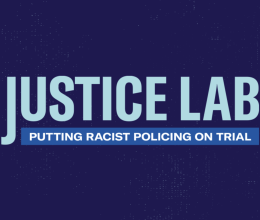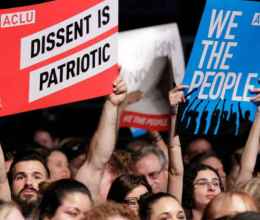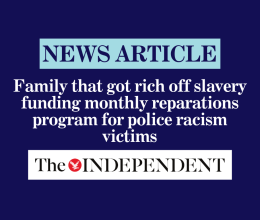The images are as chilling as they are familiar: a Black person is killed by a white police officer who is never held accountable or punished for the crime.
George Floyd, Breonna Taylor, Ahmaud Arberry, Alton Sterling, Eric Garner, Philando Castile, Sandra Bland, Michael Brown, Tamir Rice, Trayvon Martin – their names and circumstances change, but the pattern repeats, written into America’s DNA like a double helix of racial terror and violence spiraling back centuries.
All of this is painful – but none of it is new.
The uprisings that have engulfed our cities are a response to our country’s continued failure to stem this scourge of violence or confront the institutionalized racism that fuels it. A rebellion against injustice, however rageful, should never be confused with the injustice itself.
Since the birth of our nation, police have had the state-sanctioned authority to imprison and murder Black people without consequences. Two hundred and fifty years of chattel slavery was followed by thousands of public killings by way of lynching. The racial terror of Jim Crow gave way to systemic discrimination and mass incarceration. Today, modern-day lynchings occur daily and are sprawled across our televisions and social media feeds. Six years since police killings in Ferguson and elsewhere sparked a nationwide movement for Black lives, the annual number of people killed by police has barely budged.
Now it is 2020, and from our public squares to our prisons, we are literally surrounded by monuments to Black oppression and institutions that were custom-designed to perpetuate white power.
But four hundred years after the first slaves were forcibly and violently brought to these shores, too many Americans fail to acknowledge the legacy of white supremacy that is hard-wired into our institutions.
Too many white people don’t know our country’s blood-soaked history of slavery and Jim Crow. They don’t know the history of white mobs killing hundreds of Black men, women, and children in massacres across the South. They don’t know that our very national anthem, the Star-Spangled Banner, celebrates the murder of slaves in its third verse. When they think of President George Washington, they remember his heroic leadership, but they don’t know that his own false teeth were pulled violently from the mouths of slaves.
White supremacy is the cancer that is killing us. The question now is whether we will accept the difficult treatment our collective healing requires.
First, the epidemic of police violence must be addressed with systemic changes to law and policy. That means accountability for officers who brutalize our communities, stricter civilian oversight for police departments, and more restrictive policies against the use of force. It means ridding our police departments of military equipment and weaponry, renegotiating police union contracts that protect killer cops, and scaling up alternatives to policing and arrest. The ACLU is joining the Movement for Black Lives in advocating for a wholesale divestment from police so that we can reinvest in schools, communities, and people – not cops.
But even all that is not enough.
Racist policing is a symptom of our racist society, where white people feel entitled to police, interrogate, and murder Black people for simply going about their daily lives.
Take Amy Cooper, who thought the way to resolve a disagreement with a Black birdwatcher was by calling the police to report that “an African-American man” was “threatening” her life. In a single year alone, CNN documented dozens of instances where Black people were reported to the police for doing mundane activities – from operating a lemonade stand to asking for directions.
Racism is structural, it is endemic, and it has produced discrimination at best, violence and murder at worst, in every corner of our country. America’s original sin is now a sickness, and a cure depends on ending our collective denial about its cause.
What’s missing from our national consciousness is a full and honest understanding of American history. Not the romantic history of myth and grandeur, but the true history of slavery, violence, and oppression.
Amid another national reckoning with the demons of our past and present, our ability to move towards healing and reconciliation depends on our willingness to take an honest look at ourselves.
Our country was forged out of slavery and oppression. But our founders also planted the seeds of our salvation: with those words, that all of us are created equal, and that life, liberty, and the pursuit of happiness is the fundamental right of every American.
Together, through an unflinching admission of and atonement for our sins, we can deliver on America’s promise of freedom and justice for all.






